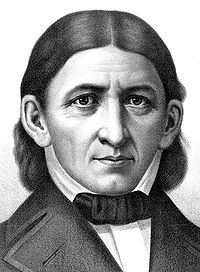 |
| Friedrich Fröbel |
Kindergarten long was considered a child’s introduction to formal learning and consisted of periods of play and social development. However, a dramatic increased emphasis on early academics has risen in the past few decades and 5 year old children do indeed have learning expectations far exceeding those of yesteryear. Research indicates that children learn more in the earliest stages of their life than at any other time and the movement to better capture a child’s massive brain growth does have warrant. But careful consideration needs to be given to how children learn and what is developmentally appropriate. You’ll be hard-pressed to find an early childhood expert or a Kindergarten teacher that would advocate for a classroom of 5 year olds sitting at desks working on worksheet after worksheet. In fact Dr. John Medina, director of the Brain Center for Applied Learning Research at Seattle Pacific University has said, "If you wanted to create an education environment that was directly opposed to what the brain was good at doing, you would probably design something like a classroom."
There are a great many benefits of a Montessori learning environment for young children and the beginning of their formal education. The individualized curriculum of a Montessori environment where children truly learn and discover at their own pace allows for children across the entire developmental spectrum to maximize their personal achievement. It is fundamentally understood and research affirmed, ‘learning-by-doing’ lays the foundation for higher learning. Dr. Adele Diamond, Canada Research Chair in Developmental Cognitive Neuroscience at the University of British Columbia found and published, “motor development and cognitive development may be much more interrelated than has been previously appreciated. Indeed, they may be fundamentally intertwined.” The learning materials in a Montessori classroom allow for children to touch, explore, and discover. This tactile learning allows for children to experience their environment which is the essence of the natural process of education. The multi-age classroom environment enhances a child’s self-confidence and self-esteem -- two qualities paramount to attempting new things later in life. Our students are encouraged to work at an individual pace and work with others who are at a similar level of academic development regardless of age. Additionally, older children are encouraged to share their knowledge with their classmates and serve as mentors or role models for the younger members of their class. Our Kindergarten students also have an extended work period in a small group environment often with a student to teacher ratio around 6:1. This intimate learning environment allows students to experience learning and encourages thinking. Our Kindergarten work period teems with creative and collaborative learning, fostering problem-solving techniques and building a foundation to achieve.
While working on this entry, I came across a great line by Dr. Amanda Moreno in the Huffington Post - "Somehow I don't think Robert Fulghum's list of essential lessons learned in kindergarten would have the same ring to it if among "share everything" and "play fair" appeared "100 sight words," "command of capitalization and punctuation," and "compose and decompose numbers 11-19." The idea that children 5 years of age are required to meet certain academic benchmarks is a bit misguided, however children this age (and younger) when properly guided can accomplish amazing results. Montessori education is a preparation for life, not a search for intellectual skills. The children have one intuitive aim in their self-development; they want to develop their inner resources and ability to cope with a strange and complex world. The child who accomplishes this, moves into harmony with this world and becomes a whole person. Montessori as an educational approach is not designed simply to teach children basic skills and information. Children need to learn to trust their own ability to think and solve problems independently. Montessori encourages students to do their own research, analyze what they found, and come to their own conclusions. The goal is to lead students to think for themselves and become actively engaged in the learning process.

No comments:
Post a Comment